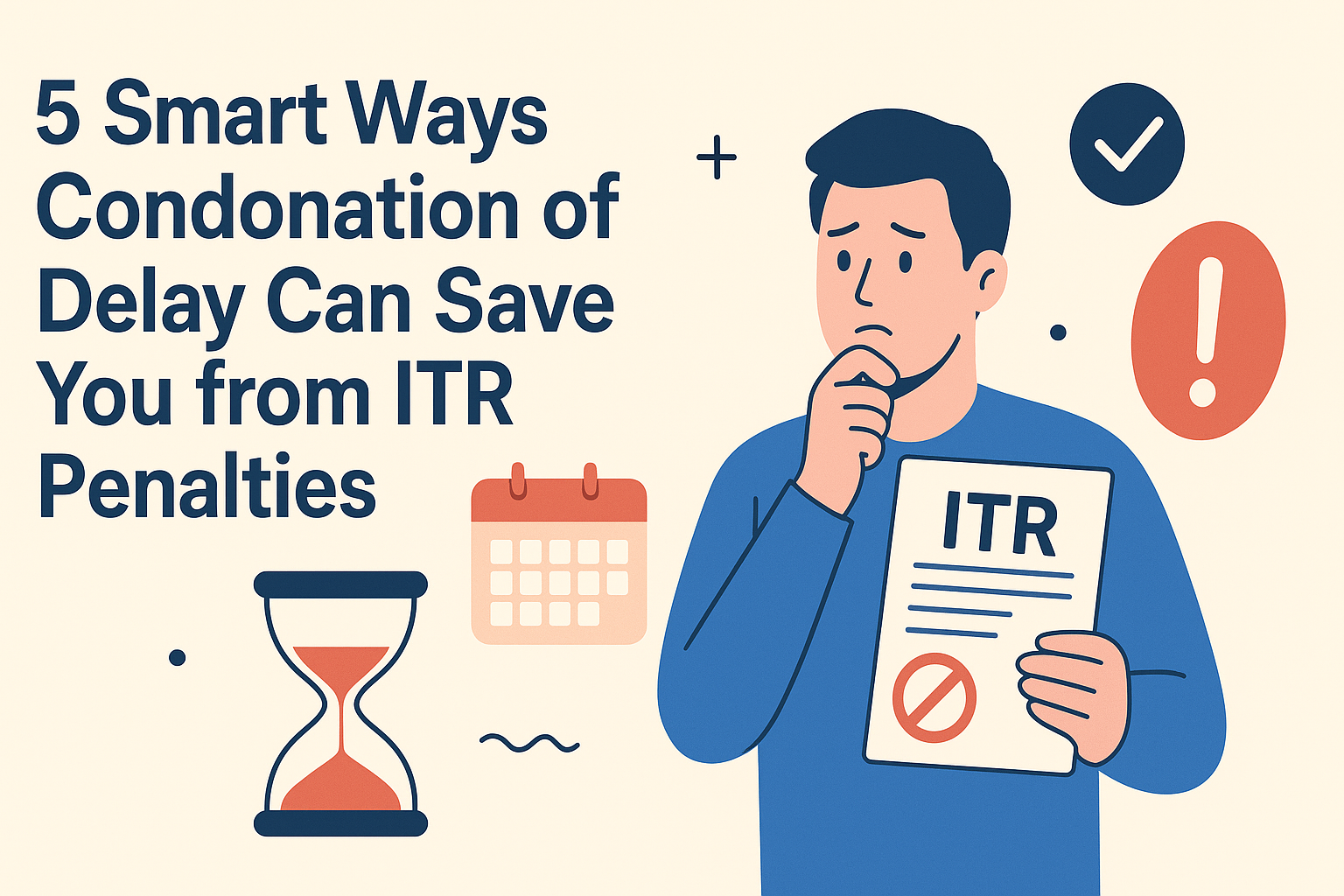Filing Income Tax Returns (ITR) on time is crucial for every taxpayer in India. Missing the deadline can lead to severe ITR Penalties, interest charges, and even the loss of certain tax benefits. However, the Income Tax Department provides a lifeline for taxpayers who miss the deadline due to genuine reasons – the Condonation of Delay request. If approved, it can help you file your ITR without paying additional taxes, interest, or ITR Penalties.
This comprehensive guide explains what condonation of delay is, how it works, who can apply for it, and how it can help you avoid hefty ITR Penalties.
Understanding ITR Penalties
Before exploring condonation of delay, it’s essential to understand the implications of missing the ITR deadline. Under the Income Tax Act, failing to file your return on time can lead to:
- Late filing fees under Section 234F
- Interest under Section 234A
- Loss of certain tax deductions
- Higher scrutiny from tax authorities
These ITR Penalties can range from ₹1,000 to ₹5,000 depending on your income level, and additional interest may apply based on unpaid tax liabilities. However, with condonation of delay, there’s a way to escape these penalties.
What Is Condonation of Delay?
Condonation of delay is a provision under Section 119(2)(b) of the Income Tax Act, 1961. It allows taxpayers who missed their ITR filing deadline to file their returns without incurring ITR Penalties, provided they have a valid reason for the delay.
The Income Tax Department evaluates each application on a case-by-case basis. If the reason for missing the deadline is deemed genuine, the taxpayer is granted approval, enabling them to file their ITR without penalty or interest.
Eligibility for Condonation of Delay
Not every taxpayer is automatically eligible for this relief. Some key points include:
- The delay must be due to genuine hardship or unavoidable circumstances (e.g., medical emergencies, technical glitches, natural calamities).
- The taxpayer must provide valid supporting documents to prove the reason for the delay.
- The Income Tax Department has full discretion to accept or reject the application.
If approved, the taxpayer can file their return under Section 139(9A) without ITR Penalties, unlike the ITR-U option under Section 139(8A), which involves additional tax payments.
ITR Filing Deadline for 2025
Typically, the deadline for filing ITR in India is July 31. However, for the assessment year 2025–26, the deadline has been extended to September 15, 2025. Taxpayers who still miss this extended deadline risk facing ITR Penalties, unless they successfully apply for condonation of delay.
How Condonation of Delay Helps Avoid ITR Penalties
Once a condonation of delay request is approved, taxpayers can:
- File their ITR beyond the deadline
- Avoid late filing fees and interest charges
- Retain eligibility for certain deductions and benefits that could be lost with delayed filing
This provision provides significant financial relief and protects taxpayers from the burden of ITR Penalties that would otherwise apply.
How to Apply for Condonation of Delay
The Income Tax Department has simplified the process through its e-filing portal. Here are the steps:
Step 1: Log In
Visit https://eportal.incometax.gov.in and log in to your account using PAN/Aadhaar and password.
Step 2: Navigate to Condonation Request
On the dashboard, go to ‘Services’ → ‘Condonation Request’.
Step 3: Fill the Application
Select the relevant statutory form, click on ‘Create Condonation Request’, and provide details of why you missed the ITR deadline.
Step 4: Upload Supporting Documents
Attach valid proofs supporting your reason for delay – medical records, technical error logs, or any other evidence.
Step 5: Submit Request
Once submitted, the Income Tax Department will review your application and notify you of its decision.
What Happens After Approval?
If your condonation of delay request is approved:
- You can file your ITR under Section 139(9A) without additional taxes or ITR Penalties.
- You must upload and e-verify your ITR promptly after receiving approval.
- You will avoid late filing fees, interest, and potential scrutiny related to delayed submissions.
When Can a Request Be Rejected?
The Income Tax Department may reject a condonation of delay application under the following circumstances:
- Invalid or weak reasons for missing the deadline.
- Repeated non-compliance in previous years.
- Failure to provide supporting documents proving the reason for delay.
- Negligence in tax payment or efforts to file within the prescribed time.
A rejected application means taxpayers may have to pay ITR Penalties and possibly additional interest charges as per Section 139(8A).
Condonation vs ITR-U Filing
Taxpayers who miss the deadline can either:
- File an ITR-U (Updated Return) under Section 139(8A), which attracts additional taxes (25% to 50% of unpaid tax), or
- Apply for condonation of delay, which waives off such charges if the reason is genuine.
For those looking to avoid ITR Penalties entirely, condonation of delay is the better option.
Best Practices to Avoid ITR Penalties in Future
While condonation of delay provides a safety net, it should not be relied upon regularly. To avoid penalties and maintain smooth compliance:
- File ITR well before the due date.
- Keep financial records and supporting documents organized.
- Use the e-filing portal to track deadlines and reminders.
- Seek professional assistance for complex tax matters.
Final Verdict
ITR Penalties can be a significant financial burden for taxpayers who miss filing deadlines. Thankfully, the Income Tax Department’s condonation of delay provision offers a way out for those with valid reasons for late filing. If approved, you can file your ITR without incurring penalties, interest, or additional tax liabilities.
However, timely compliance remains the best strategy. Use condonation as a last resort and ensure you follow best practices to file on time. By doing so, you safeguard your finances, avoid ITR Penalties, and maintain a hassle-free relationship with the tax authorities.
